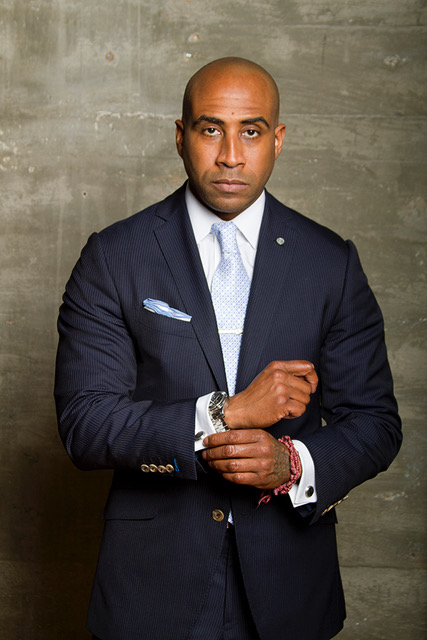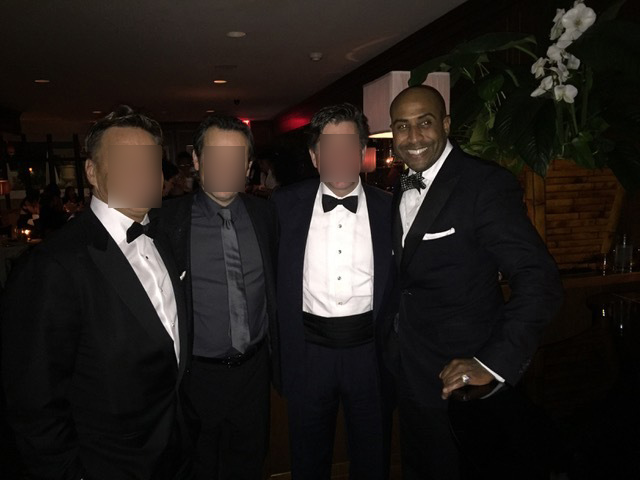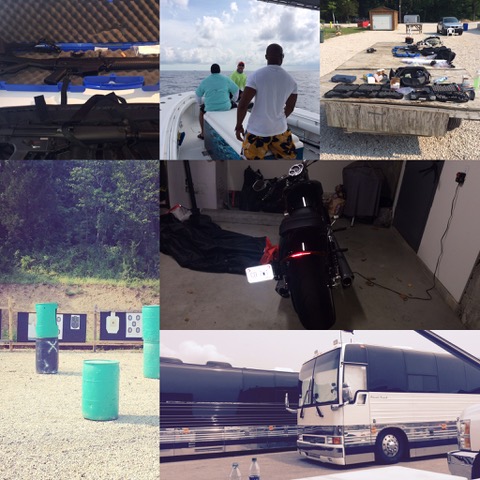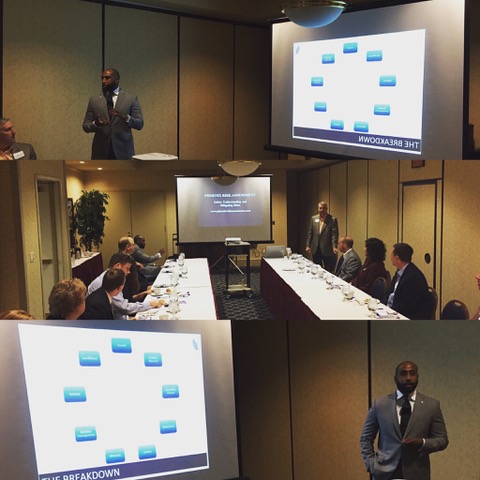In an insightful – and daring – conversation with Michael Henderson, head of several flourishing companies, we cover career transitioning and what it takes to be an elite EPA and a successful entrepreneur ― at the same time. As a matter of fact, we also explored if entrepreneurship and executive protection can be soul mates.
You started your professional career as a police officer and then moved into private security. Why did you make this leap from the public to the private sector?
When I was a police officer in St. Louis, Missouri, in the early 1990’s many of my friends were leaving local and applying to federal law enforcement agencies. The US Secret Service is one of them.
The suggestion of looking into the “private sector” where they retire may have been an excellent fit for my personality. So, in 1996, I began researching personal and corporate protection. I found “The Executive Protection Bible,” written by Martha J. Braunig.
After studying that religiously, I began going to professional training schools, many overseas. My friends were correct, and in the late ’90s, the opportunities were endless throughout the world.
I bravely leaped, starting on my own but quickly faced the most prominent challenge of them all. I was an operator, a former officer, but I was yet to be a businessman.
Because of that lack of knowledge and experience, my journey had a rocky start. I didn’t understand business strategy, packaging the vision, service quality, how to close a deal and retain the client. Still, these were massively crucial pieces of comprehension to be able to compete in the protection industry.
Besides the initial career transition, you also became a prominent entrepreneur in the media production and management business. How many firms are you currently running exactly, and how much time do you invest in maintaining them, if any?
Interestingly enough, I didn’t realize until later in life that I was selling things at a young age. Working at my grandfather’s candy store and watching other people around me own smaller businesses must have rubbed off on me. I have seven active companies that surround and support the “parent core/company.”
One, of course, being in the protection space where our focus is primarily on high-net-worth families. I have worked with them for over 20 years. So hence, if their businesses and families grow, we remain right there ― keeping them secure.
At first glance, most may not see the connection to media with protection. A large part of what my core company, S.U.I.T.E. Media Productions & Management, handles is developing relatable content of the protection industry.
Women-driven stories and all-inclusive action projects. Embracing not only an entertaining component with as authentic material as possible, but all the while also remaining true to the industry.
My initial and current objective is to improve the executive protection industry’s image with their clientele and service operators.
Additionally, I am continuously supporting those who truly understand that this is a reputable field and with more robust guidelines, accreditations, and the true professionals maintaining their integrity.
Eventually, there will come easier ways to identify fake and phony protectors.
I work quite a bit. However, I have quality people who allow me to delegate. There is never a point to have people on your team if you’re not allowing them to step up and be productive.
My time is a hilarious thing. With a second book coming soon, a lot of philanthropy, traveling for work, I comfortably find ways to utter life balance and peace.
There are times where I am working non-stop for 30-40 days to complete a task or meet a deadline. On others, I am working a typical business day with the occasional step away and take a call or meeting throughout the evening.
Diversification must have been on your mind when you created all these thriving organizations. Do entrepreneurship and executive protection go hand in hand?
That’s a great question about diversification. Depending on who you ask, you may receive a two-sided answer. Some believe focusing on one thing makes it successful and then expanding or moving to the next action or business. In my opinion, this mentality is not incorrect. In fact, it’s damn logical!
However, you then meet people like me.
The person strategizing with their team. And we all realize that if we bring in certain services in-house, we can control “Workflow and Time Management.” This allows us to ensure the timeliness of deliverables by cutting out some vendors’ delays. Of course, there are pros & cons to this. Still, if it saves money either initially or in the long-term, you may find it efficient and profitable.
When we decide to take this action in our company, we now become a service provider for others within a specific industry. We feel no one can be as critical and demanding a client as our in-house teams are on ourselves.
In an earlier question, I lightly touched on it. To literally be in the executive protection industry as an agent/operator, you MUST look at yourself and/or your business from the eyes of an entrepreneur. So, yes, entrepreneurship and executive protection can go hand in hand.
There is no other way to maintain longevity and remain relevant. I enjoyed how you phrased the question: entrepreneurship and executive protection. Like many business owners, you not only have to be proficient in the industry you are working inside, you must become creative in finding the best ways to sell your product.
Many times, you are the product.
Your client(s) are “purchasing” you… Even if you’re just the face of the company and others work underneath you, they’re buying because of you.
Your reputation and creativity to bring to your clients are to assist you in becoming the best provider. That’s paramount to your success and applies to both entrepreneurship and executive protection.
I will share one example. Most of those in my industry were heading to the tradeshows or insurance conferences to network, gain knowledge, resources, and potential clients. I was doing the same as a guest and making donations to attend a wealth advisors convention: corporate attorneys or Board of Directors annual meetings and events.
So you’d find me listening and learning while at the retreats of CPAs and hedge funds, plus private equity firms.
You know what? Year after year after year, I never saw anyone selling protection services directly to these people like I was. These people are the gatekeepers to your clients. These efforts built what has proven to be over 25 plus years of great friendships and great clients for me.
It is not too often the case that EP agents are also well-versed in the art of writing. Yet, you wrote a book titled Interminable: Stories and Steps to Overcoming Life’s Obstacles After a Repetitive Cycle of Pain and Loss. How to Maintain Your Win! Well, how do you maintain your wins in life and business, Michael?
Writing, man, let me tell you. (laughs)
First, I have to say more and more agents are writing books on best practices to become elite in the protection industry. I am super supportive of these books and authors. I like the saying that “all knowledge gained is good knowledge earned.”
Secondly, even when we see some idiots do something unprofessional. Such as breaking the “confidentiality” with their clients and themselves. Frankly, it is a black eye on the positive efforts in the industry. Actually, in any trade, including entrepreneurship and executive protection.
Knowing what to do and sometimes what not to do, by way of bad examples, is all education for improvement. I am also constantly learning, and I am never the most brilliant guy in the room. But I ensure I can find and bring value whenever I can.
My Book Interminable was genuinely geared to helping anyone who wanted to understand the “long story” of daily challenges and a possible different mentality on how to get through it. I used personal life stories along with some protective assignments I felt added significant value to the book.

Executive protection agents are now in the business world and must juggle their knowledge in various disciplines.
This is a HUGE advantage for the security entrepreneur and another example of the blend of entrepreneurship and executive protection. When I began for almost a year, I had a great working skill set to provide physical protection for any client I could get.
However, with all the training, it wasn’t easy to get work. The times weren’t merely challenging. I was homeless in St. Louis for four months in an attempt to build my business. I would sneak into networking events and pass my business cards around in hopes of landing a client.
In between those periods, I spent much time in the downtown library’s business section. Every day I read business leaders’ books. But, unfortunately, in those days, the books had limited information that could help a guy like me with no resources at the time and nowhere to find resources.
I promised myself in 1997 that if ever I got to a place in life where I could write a book, it would share every detail of the journey to help many who find themselves stuck, lost, or defeated. If you are breathing, you will make it. Knowing and believing something that simple initially can get you started.
I realized and continued to see how many people don’t have much to work with to overcome their current problems.
But they have the best asset ever. They have themselves. Once you gain that realization, no appearance or personality glitch will stop you from becoming the success you dream of becoming.
Maintaining my wins begins with acknowledging that temporary setbacks, disappointments, betrayals, and periodic losses can be part of the life and business journey. Entrepreneurship and executive protection have both taught me a lot in this respect.
This understanding of the self helps me realize that it is simply temporary. Furthermore, that damage control plus transparency are everything to snapping right back into the winning spot of your life.
In addition, I avoid complacency. I stay far away from things I genuinely don’t need to be part of, such as specific conversations and immediate identification that someone is wasting my time. These keep me focused, balanced, and result-oriented.
Does a flourishing business need a marketing team? Can you solely rely on word of mouth even after years of doing business?
You have met my CMO. She and her team are really “bad-asses.” For us, having an in-house marketing team with specific specialties works wonders. So the answer is an unequivocal YES!
Being “old school” in the protection industry, I remember vividly that word of mouth was the only way to get clients. So we stayed away from cameras and did everything not to be seen as an intrusion. This worked wonders for me until it almost forced us to close our doors.
Two critical things were occurring. One, the internet was becoming the source of information that it is today. Therefore, people were googling to find out how legitimate you were as a service provider.
Two, I was forced to hire for a brief period a publicist to open the door for my TV commentary on particular criminal activity as it pertained to protection. All was almost lost because CIA officers and others were breaking their silence and speaking on news outlets.
At the time, my company had very little press ― if any ― because we were operating in a different era with different methods to success. A.k.a. “word of mouth.” All these actions forced my teams and me to “come above board” or “into the light.”
I don’t mean to be dramatic, but I recall how scary it was making this transition by finding a new balance of saying just a little but not too much to place you, your team, and your client in harm’s way.
I advise locating a marketing or PR firm that truly understands you and your business. This mutual understanding shall provide you with a solid foundation and agility to find your sweet spot in the media and your industry. No matter if it’s entrepreneurship and executive protection or some other field.
In the sense of entrepreneurship and executive protection, can you provide some insight into your biggest failures as a professional?
Definitely!
In the above answer, I was referencing hiring a publicist. Suppose I hadn’t caught the transition, and my Board of Directors hadn’t approved the budget for such adjustments. In that case, it would have been possibly a more arduous road for us. We would have missed the timing of adjusting to a new business climate.
As a professional, I’ve owned a jazz bar-restaurant, women’s shoe store, design company, hats and sunglass shop, and a few others that were all total flops. In addition, I owned a company that was hit hard by the economic crash in 2007-08 — lost millions during that era.
I attest that most of those opportunities indeed failed after some time due to inexperience in operating a business.
Of course, they all were different businesses, but they all required some business acumen, which I was missing — both for entrepreneurship and executive protection.
However, the upside is they all provided a learning advantage for continued success in my protection company and future ventures.
One of the biggest mistakes I made in 2014 was not replacing me as CEO of the business. The business was snowballing. Also, the services had broadened to a point where I had to divide my leadership attention.
During Board discussions and with the administrative team, we all believed we would start our search in 2016. That would allow us the time to build a stronger foundation on our new service offerings while preparing for whoever would take over as CEO.
The purpose of using this as a mistake was due to the challenges we faced afterward. The growth was too rapid, and human resources were stretched very thin. As a result, there was a lot of pivoting taking place to regain our footing and focus.
To wrap this up, Michael, what is the most helpful advice you can impart to somebody who wants to try out both sectors ― entrepreneurship and executive protection? And what do they have in common?
I see this as being a great time to get into the executive protection space. With certain military personnel returning home and many law enforcement, people and citizens without the above skills are transitioning, bringing great people to the field. I hope this to be an ongoing positive objective.
Learn as much as you can. I know ASIS/GSX Executive Protection Community has an excellent Mentoring program. In addition, there are many professionals ready to share with you a potential road map to help you find success. Finally, I would share another piece of advice: do not be afraid to be yourself, your individual self.
Networking is essential to the success of your business.
These referrals you obtain from protection agents with a work overflow of assignments could assist you in building a positive name within the industry. In addition, these opportunities showcase your abilities.
You may have a skill set that may not seem to fit “the mold” of what an agent looks like—yet, understanding that the job has become about multiple skillsets to enhance your clients’ experience with you.
I see this as critical because as you build the professional and trusted client relationship, you just may begin to find yourself with clients who do not make their decisions based on budgets and cost for service.
But instead, base your retention on the quality of work you provide and the enhanced all-encompassing assistance with the value you bring them. Ultimately, this is the commonality between entrepreneurship and executive protection.
To grow, you must always be wearing multiple hats, have great intentions to be successful, creating a solid yet fluid plan for your success. And lastly, remain a good fu**ing person.
You do that, you WILL succeed, and you will WIN!








